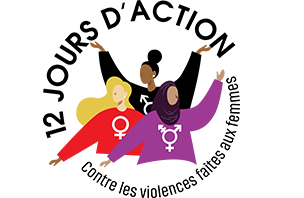
Women’s Centres on the Front Lines of Violence Intervention
As December 6 approaches — the International Day for the Elimination of Violence against Women — L’R des centres de femmes du Québec makes a push to underline the extent of the work happening in the province’s 82 women’s centres in aiding women grappling with violence.
The fact is that the need for violence intervention has greatly increased and become more complex. Be they women confined with a violent domestic partner, mothers managing the health choices made by their child’s other parent, those contending with pandemic-related financial challenges or the worsening housing crisis, or those worried about contracting COVID-19 in shelter resources, many have turned to women’s centres to break their isolation, seek solace, and get frontline support. “The work of women’s centres is broad and not focused on one specific issue,” explains Stéphanie Vallée, co-coordinator at L’R des centres de femmes du Québec. “For many, women’s centres are their first line of support. It’s where they can get help without having to make it a formal undertaking.”
Truth be told, and pandemic notwithstanding, women’s centres are on the front lines when it comes to the fight against systemic gender violence. According to a 2018 survey among workers from 82 women’s centres, more than 90% reported having intervened in cases where women faced psychological, verbal, sexual, economic or physical violence. In a context where institutional resources are overcrowded, costly, or carry some form of stigma, many women choose to seek help from women’s centres where they can get free assistance from a network that uses a broad-based, intersectional feminist approach. “Women’s life experiences are at the heart of the approach used by women’s centres,” explains Vallée. “By pooling women’s experiences together, we help them build solidarity and break their isolation. This helps them re-empower themselves and take back their lives, which in turn can also help transform communities.”
Women’s centres have long earned their stripes when it comes to violence intervention. In 2019, they made their efforts in the fight against gender violence a strategic priority. The L’R collective has since launched the e’Radicate Violence program to further develop their approach to gender violence and build up the strategies used across its network of women’s centres. The program also works closely with the Trajetvie initiative to document violence intervention practices within women’s centres. More recently, as part of the 12-Day campaign, the collective’s French-language podcast, On brasse de L’R , devoted some time to seeking out a better understanding systemic violence and the feminist approach through an intergenerational conversation.
